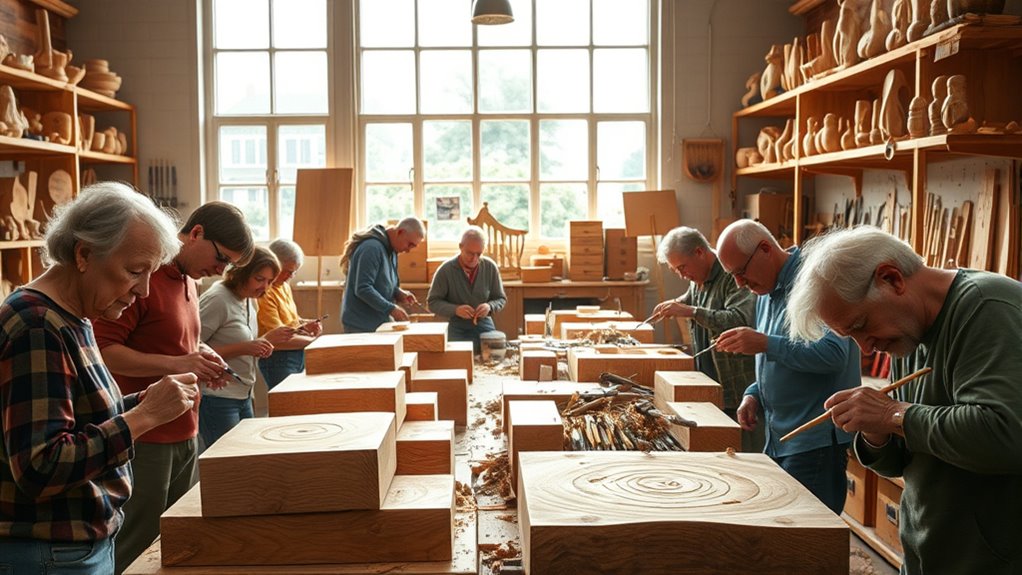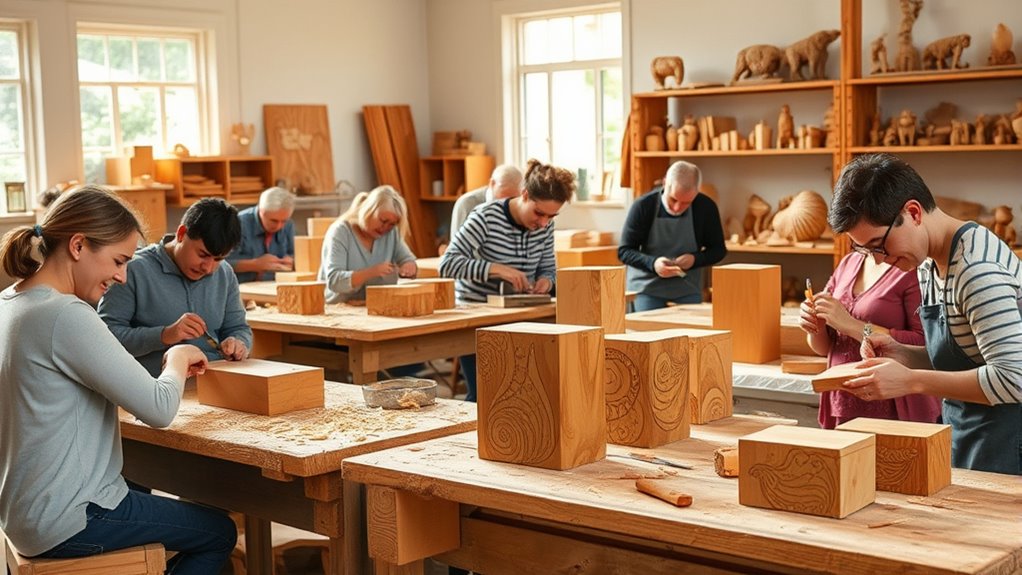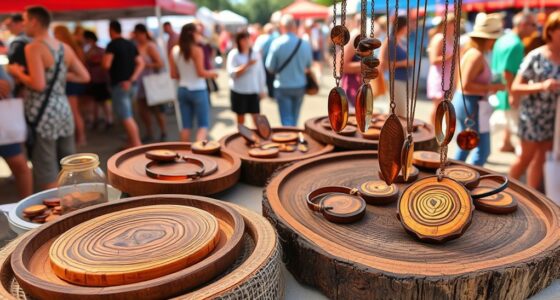Therapeutic woodcarving workshops are growing across the UK, offering you a calming, hands-on activity that promotes mental well-being. These sessions are accessible for beginners and experienced makers alike, focusing on safety, skill-building, and creative expression. They foster social connections and support mental health through mindfulness and concentration. As the craft scene expands, more communities embrace these benefits. Keep exploring to discover how you can get involved and experience the therapeutic power of woodcarving firsthand.
Key Takeaways
- Therapeutic woodcarving workshops are increasingly available across UK community centres, specialist schools, and private providers.
- These workshops emphasize mindfulness, stress reduction, and mental well-being through hands-on craftsmanship.
- They promote social engagement and community building among diverse participants.
- Initiatives aim to include disabled and underrepresented groups, fostering inclusivity in craft therapy.
- The growth supports personal development, with participants often turning skills into small businesses or creative projects.

If you’re interested in exploring traditional craftsmanship or developing new skills, woodcarving workshops across the UK offer an accessible and engaging way to get started. These workshops are increasingly popular because they combine hands-on learning with therapeutic benefits, making them appealing to a wide range of participants.
Whether you’re a complete beginner or have some experience, you’ll find sessions designed to suit your needs. Many community learning centres, specialist schools, and private companies now offer short-term practical workshops aimed at introducing basic skills like chisel handling, understanding wood grain, and finishing techniques. The diversity of workshops reflects the growing interest in craft-based therapy and skill development.
These sessions typically blend theory with practical exercises, so you’ll learn about safety, tool control, and how to create a small carved piece by the end of the day. Workshops often include demonstrations of sharpening tools, reading wood properties, and sourcing timber and tools for ongoing practice, helping you develop confidence and competence in your craft. Engaging with mindful activities such as carving provides a calming, meditative experience that enhances mental well-being. Additionally, understanding material properties is essential for producing quality work and ensuring durability.
The rise of these workshops reflects a broader recognition of woodcarving’s therapeutic potential. Engaging with wood and tools provides a calming, mindful activity that can reduce stress and improve mental well-being. Participants often report feeling more relaxed and focused after a session, as carving encourages concentration and creative expression.
Beyond individual benefits, these workshops foster social connection and community building. Many people find that working alongside others creates a sense of camaraderie and shared purpose, especially in group settings. For some, learning a new craft becomes a way to connect with history and tradition, preserving skills passed down through generations while also making art that can be both functional and decorative.
The expanding availability of these workshops also supports inclusivity. As the craft sector grows, efforts are underway to make woodcarving more accessible to diverse groups, including disabled makers and those from underrepresented backgrounds. Around 25% of craft makers in the UK are now disabled, and initiatives aim to increase ethnic and gender diversity within the community.
Participating in a woodcarving workshop can be a step toward personal development, offering a satisfying outlet for creativity and a chance to discover a new passion. The UK woodworking industry, which includes craft sectors like woodcarving, contributes significantly to the economy and community development. With a growing market for craft products, many participants turn their skills into small businesses or side projects, further fueling the sector’s vibrancy.

Wood Lathe, 14" x 40" Benchtop Wood Lathe Machine 0.5 HP Infinitely Variable Speed 1040-2980 RPM, Wood Turning Lathe Machine with Wrench & 2 Chisels for Woodworking, Woodturning
DIY Wood Lathe : Our benchtop wood lathe is expertly designed with a spacious 40-inch workbench and high-performance...
As an affiliate, we earn on qualifying purchases.
Conclusion
As these therapeutic woodcarving workshops spread across the UK, they become beacons of healing and self-discovery. Like a gentle river carving valleys through stone, you’ll find yourself shaping not just wood, but your own well-being. Embrace the craft, let your worries melt away with each carve, and watch as your inner landscape transforms. This movement isn’t just about wood—it’s about carving out a happier, healthier you, one stroke at a time.

VEVOR Benchtop Wood Lathe, 10 in x 18 in, 0.5 HP 370W Power Wood Turning Lathe Machine, 5 Variable Speeds 780/1320/1920/2640/3840 RPM with Rod Injection Wrenches Faceplate Foot Pads, for Woodworking
Professional DIY: Our benchtop wood lathe is designed with an 18-inch workbench and powerful capabilities, meeting the needs...
As an affiliate, we earn on qualifying purchases.

Grizzly Industrial T25920-12" x 18" Variable-Speed Benchtop Wood Lathe
This Variable-Speed Wood Lathe provides 12" of turning radius and spindles up to 16-1/2"
As an affiliate, we earn on qualifying purchases.

Wood Lathe Machine, 12 x 18 inch, 550W 3/4HP, 5 Speed Settings 680-2770 RPM,Benchtop Lathe with MT2 Drive/Live Center
Powerful 3/4HP 550W Motor: The high-performance AC motor delivers consistent power for smooth wood turning. It prevents overheating...
As an affiliate, we earn on qualifying purchases.









